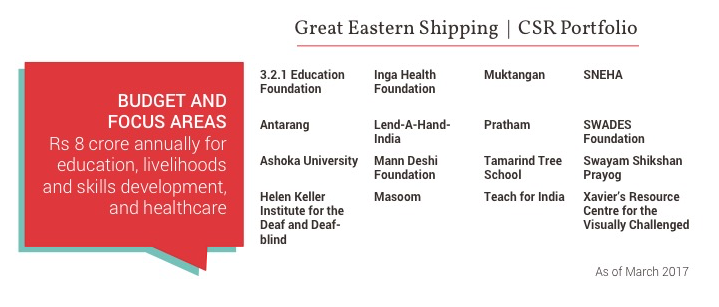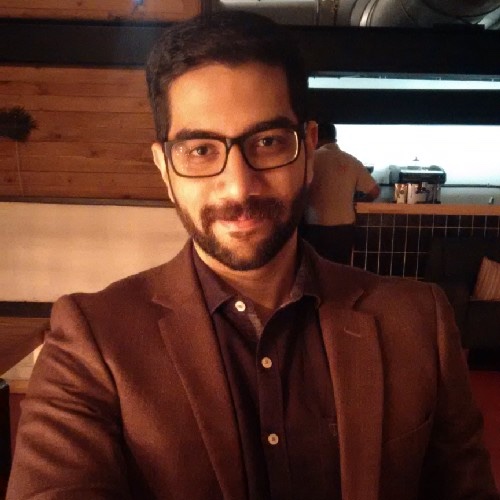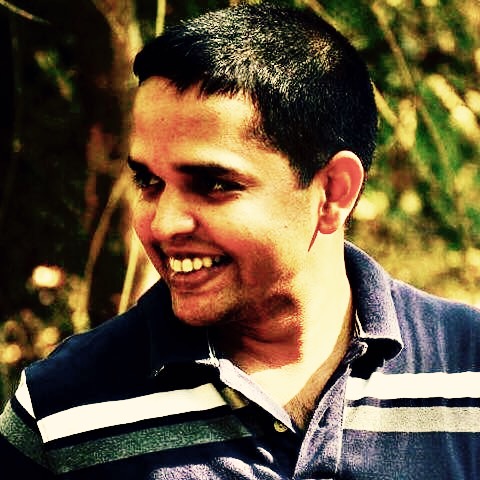Corporate giving for us was born out of The Companies Act, 2013. Yet, what began as an earnest effort at compliance quickly grew into something bigger and more meaningful.
As a shipping company, we had some advantages starting out. Unlike our manufacturing peers, we weren’t geography-bound. Nor had we any CSR legacy, which meant fewer constraints around strategy (other than those that accompany complying with The Companies Act, 2013).
This also meant that we had lots to learn. At first we tread cautiously, giving grants to established nonprofits with large budgets and reputed funders.
We had a small team and limited funds–we wanted to make the most of both.
Our ultimate goal was to economically empower people from disadvantaged communities, so we zeroed in on education and livelihoods as our focus. We had a small team and limited funds–we wanted to make the most of both.
Looking back, we’ve learned a great deal. Our lessons have informed how we give as well as how we work with nonprofits as equal partners.
What we learned by doing
Year one was about learning, stumbling, iterating and refining. We didn’t have all the answers and were prepared to be patient if it rewarded us with insights on using our funds well.
During this time we realised two things: a period of one year demands an unrealistic pace of change on the ground, and, it is not enough time to learn about the sector. So, we extended our timeline to three years, by which point we hope to have a nuanced understanding of the mix of program approaches, partnerships, time frames and metrics that make sense for Great Eastern Shipping (GES).
Not jumping into building a rigid comprehensive strategy also allowed us to course correct. For instance, we included health and nutrition as a focus after we learned from one of our grantees the critical role it plays in children’s school attendance.
Not jumping into building a rigid comprehensive strategy allowed us to course correct.
Our learning has also guided how we approach grantee agreements. Our partnerships now account for longer-term horizons so that nonprofits can prioritise program outcomes over fundraising and contract renewals.
This helps us too, allowing greater flexibility in grant planning as well as a more realistic definition of what change to expect. Moreover, a longer partnership term incentivises both parties to be more invested from the start.
Nonprofits understand the business of changing lives better than we do, so we take our cues from our grantees. We allow for institution building/M&E expenses up to roughly a third of the budget – in other words, we pay what it takes to create impact.
We take our cues from our grantees.
Grant decisions result from in-depth conversations with nonprofits–understanding needs, what it takes to achieve objectives, and where our money will be put to best use.This has allowed us to build long-term grantee relationships that go beyond funding.
Initially, as we began receiving proposals, decision-making was prolonged due to how infrequently the CSR committees of both companies in the Group–The Great Eastern Shipping Company Ltd. and Greatship (India) Limited–were able to convene.
To avoid delays, our management created an internal CSR committee, headed by our Deputy Chairman and Managing Director, and comprising senior leadership. We meet monthly–to share learnings and allow the committee to ask questions, but more importantly, to have them learn as we learn.
While these meetings began as a means of acting quickly, they’ve had the added effect of addressing information asymmetry between the CSR team and the senior leadership; and in so doing, improving the quality of decisions around corporate grants.
“CSR has given a new dimension to the profits we strive for as managers. Now, the more that we make, the more we can give! I’ve communicated to all our mangers to look at profits, not merely as a return on investment, but as an enabler to changing people’s lives.”
– Mr. Bharat Sheth, Dy. Chairman and Managing Director
In our experience, understanding the limitations of your funds is fundamental to how you measure success. At GES, we focus on outcomes; yet, we recognise that what we achieve will depend on the strength of our investment. We don’t expect to shift policy or create population-level impact.
[quote]Understanding the limitations of your funds is key to how you measure success.[/quote]
Likewise, we’re realistic about what we demand from nonprofits. While corporate practices can be efficient, not all are directly transferrable to nonprofits.
For instance, standardisation works well in the private sector; in development, challenges and contexts are too varied for standardised solutions to stick.
Related article: Why cookie cutter models don’t work in development
Take education, where approaches that seek to improve attendance and learning outcomes are plenty. Depending on whether you are working in urban or rural India, in early childhood or secondary education, building curricula or working with school administration, your approach and what you measure must adapt to your context and its characteristics.
We started out giving to established nonprofits. Over time we realised that the greatest need is among smaller organisations doing impactful work; many lack access to funding and are often too small in size–with project budgets of Rs 5-20 lakh–to be considered by most funders.
A corporate that supports nonprofits with smaller budgets will necessarily have more organisations in its portfolio. This presents challenges including managing reporting, varied outcomes, measuring and articulating impact.
It’s therefore tempting to select larger nonprofits and avoid the managerial and administrative challenges of a large portfolio. But as funders we must go where our money is needed and can have real impact, rather than doing what is most convenient to us.
At GES, we’re a small team with a CSR philosophy that’s grounded in building partnerships with nonprofits that go beyond funding. And so we’re evaluating what the right balance is, such that we’re going where we’re needed, but can also engage meaningfully with organisations while achieving outcomes on the ground.
So, where do we go from here?
We will be approaching year three in 2018, which is when along with our leadership, we will take stock of all that we’ve learned, and build a long-term CSR strategy.
Our portfolio will likely comprise a mix of small and large nonprofits. With the former, we might commit to longer-term grants that help seed programs and develop solutions. We’ll bring in experts to build nonprofit capacities.
With the latter, we will exit some of our early investments and instead support initiatives that help spread solutions to benefit the broader sector. Most importantly, we will keep learning.








